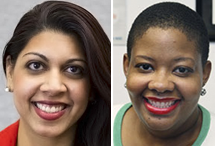 As the November presidential election draws nearer, it is clear that for the first time in American history a woman will be the presidential candidate for a major political party. And while we have significant work to do to achieve true justice and equity, women overall experience more opportunity than they ever have. For many little girls growing up today, this country is looking more promising. But not all.
As the November presidential election draws nearer, it is clear that for the first time in American history a woman will be the presidential candidate for a major political party. And while we have significant work to do to achieve true justice and equity, women overall experience more opportunity than they ever have. For many little girls growing up today, this country is looking more promising. But not all.
Girls who have traditionally been marginalized — girls of color, those who grow up in poverty, with disabilities, in the child welfare system, who are gender nonconforming and those who may fall at any of those intersections — face a greater risk of becoming involved in the juvenile justice system than ever before.
Despite the fact that the juvenile justice population has been cut in half over the last few decades, the number of system-involved girls has consistently risen. The rate of girls’ arrests, referrals to court, adjudications, decisions to place on probation and decisions to send to placement has increased by at least 40 percent, according to Gender Injustice. Girls of color, particularly those who are African-American and Native American, continue to be overrepresented in the juvenile justice system.
Research from the Office of Juvenile Justice and Delinquency Prevention tells us girls are not becoming increasingly violent. (They still only account for 10 percent of violent felonies.) Monique Morris, in her most recent book, “Pushout: The Criminalization of Black Girls in Schools,” documents the ways in which African-American girls are being pushed out of school through discriminatory discipline practices, overpolicing and an inability to respond to the needs of girls of color.
[Related: We Must Decriminalize Trauma for Girls with Histories of Abuse or Neglect]
There are documented incidents — which are the rule more than the exception — that girls are being siphoned into the school-to-prison pipeline for being loud and, subsequently, labeled unmanageable and unruly because they don’t behave in a more feminine, subdued and typically socially acceptable way. Many of the girls who are system-involved have experienced sexual and physical violence. “The Sexual Abuse to Prison Pipeline: The Girls’ Story,” a report released in 2015 by Rights4Girls, the Georgetown Law Center on Poverty and Inequality and the Ms. Foundation, details the ways vulnerable and marginalized girls are criminalized for being victims of abuse. Additionally, girls are increasingly being arrested for incidents involving family conflict.
Another significant and less often discussed reason for the increase of girls in our juvenile justice system is because we have not been paying attention. We hardly ever ask girls what is going on, and when we do, we rarely listen. Our schools, systems and homes aren’t always safe spaces for girls. We have not had conversations in our schools about sexual harassment that go beyond telling girls to dress more modestly. We have put the onus on the girls themselves rather than taking responsibility for our own complicity in their harm.
In order to ensure our girls are protected, we must develop policies, initiatives, programs and responses that place girls’ voices at the center of discussions. We must take the time to truly and clearly understand the myriad challenges our girls are facing, but also challenge ourselves to see beyond the dark statistics and remember our girls are lively, brave, brilliant, resilient and powerful. We must build on their strengths rather than our failures to protect them.
Girls, who have survived critical battles, must be their own heroes. But in order to do that, we must listen to them, ask them what they need to thrive and provide them with the support and the tools to do just that.
Maheen Kaleem is a staff attorney and Equal Justice Works Fellow at Rights4Girls, a human rights organization in Washington, District of Columbia, committed to addressing gender-based violence against young women and girls in the United States. She is also an alum of the National Juvenile Justice Network’s Youth Justice Leadership Institute.
Natalie A. Collier is the Southern Rural Black Women's Initiative for Economic and Social Justice Youth Organizer/Program Officer for the Children’s Defense Fund. She is also an alum of the National Juvenile Justice Network’s Youth Justice Leadership Institute.
More related articles:
Lost in the System: Girls, Foster Care and the Commercial Sex Trade in L.A. County
Los Angeles Trying New Tactics to Help Children, Many in Foster Care, Who Are Sexually Trafficked
Donald Trump offers more hope.